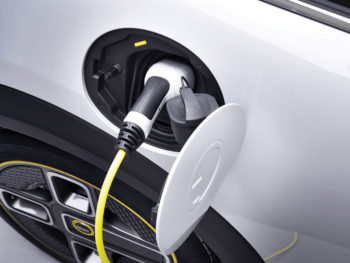EV tipping point within two years, BVRLA conference reveals
Electric vehicles will reach cost parity with internal combustion-engined vehicles by the start of 2022 latest, aided by a substantial increase in the level of production and significant falls in the cost of batteries.

Deloitte’s research indicates that EVs will reach price parity with petrol and diesel cars within the next two years
So said Dr Jamie Hamilton, director, Deloitte LLP, in a key session on EVs held at last week’s BVRLA Industry Outlook Conference.
A guest speaker for the session – which took place on 5 December and included Dr Giulia Privitera at UK Power Networks and LeasePlan’s Matthew Walters – Dr Hamilton offered a vital steer on what product is coming to market next year and in what volumes, drawing on Deloitte’s Battery Electric Vehicles report.
He revealed: “We think the tipping point is either next year or the year after, it’s somewhere in between really. And we think that tipping point will be due to two things, the number of new battery electric vehicles coming onto the market and it’s about total cost of ownership (TCO) for the everyday car driver. And by total cost of ownership, this includes maintenance, fuel, servicing and tax efficiencies as well as the cost of financing the car.”
While more work needs to be done by the industry as a whole to ensure fleets and drivers are aware of the importance of basing procurement on TCO – an issue not just consigned to EVs – the fact that it will be as cheap to own an electric vehicle as it is for a petrol or diesel equivalent will play a vital role in helping drive fleet take-up.
“There’s still some messaging to try and convince people they should care about TCO versus the lease cost or purchase price. But in the next two years, we should get to price parity anyway,” added Dr Hamilton.
This will have a major bearing on purchase decisions by fleets as well as private drivers – a recent report from the Connected Places Catapult and Digital Catapult said fleet operators will be key to driving rapid adoption necessary to reach the Government’s target of all new car sales being zero emission by 2040.
Dr Hamilton added: “Most of the forecasts, including Deloitte’s, assumes that 30% of total global sales will be battery electric vehicle by 2030. That means that essentially 30% of the total car parc in the UK will also likely be electric, because of the replenishment times we’re talking about as well.”
However, this is dependent on planned incentives carrying on – the BVRLA itself continues to call for clarity on the Plug-in Grants – and new ones such as the planned zero Benefit-in-Kind taxation on all fully electric vehicles from April 2020.
With the new rate still requiring progression to a Finance Bill after the Autumn Budget was shelved for the election build-up, Dr Hamilton highlighted the importance of zero BiK to operators, which could see fleet EV adoption double. “In the next year, the rate of company car tax is set to fall from 16% to 0% on a battery electric vehicle. We’re expecting that all of the company car fleets, essentially, will be doubling the number of electric vehicles in their fleet. And all the people we’re talking to with the bigger fleets are really preparing for this,” he continued.
And thanks to such rates, Dr Hamilton believes that next year we’ll really start to see a change in terms of electric vehicle adoption, largely driven by some of the corporates and only hampered by the issues around supply.
“The income tax on a diesel hatchback is just under £4,000 pounds per year, and a petrol hatchback around £3,000 pounds a year. Today, on an EV it’s about £2,000. But, from next year it’s going to drop to zero. So, when combined with all the savings you get on fuel and servicing etc, we’re looking at potential savings of £12-15,000 pounds per employee over a three-year lease,” he finished.

















